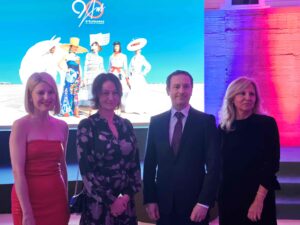We are glad to count Croatia as one of our allies and friends.
In addition to political ones, our economic relations are progressing and trade flows have increased for the past two years. There are more than 60 French subsidiaries in Croatia accumulating more than 1 billion € of investments in Croatia and employing more than 5000 people in Croatia, for our magazine says H.E. Fabien Fieschi Ambassador of France to Croatia. The presence of the Croatian unicorn Infobip in France also reflects the fact that , says Ambassador Fieschi.
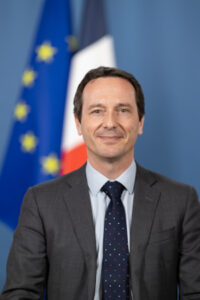
- How would you rate the relations between the two countries? Both are members of the EU, Schengen, NATO. It seems allies in all areas. between France and Croatia. Are there any issues between the two countries and how to resolve them?
I can confidently say that relations between France and Croatia are excellent. President Macron’s visit to Croatia in November 2021. has sent a clear signal of mutual interest and trust. During this visit, we renewed our strategic partnership agreement, with a special focus on our dialogue on European affairs and with South-East European neighbours. We have committed to reinforce our dialogue at political level, but also to reinforce bonds between defense and security actors, private businesses, academics… That is what keeps us busy at the Embassy, and I think we are going in the right direction ! The fact that Croatia is now not only a member of NATO and the EU, but of the eurozone and the Schengen area, and probably soon of the OECD, makes us even closer. I also have to mention the fact that Croatia has been an observer of the Francophonie since 2004, which also matters for us! We are glad to count Croatia as one of our allies and friends. We share a common vision and on most of the key issues of today and tomorrow. The perception of Croatia in France and vice-versa is very positive, and this also contributes greatly to this trust between our peoples.
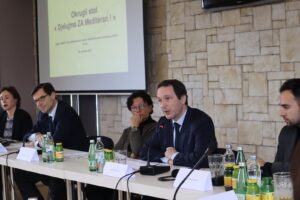
- Official Zagreb bought the famous “Rafals” from Paris. That job contributed a lot to raising the level of relations. Are similar activities planned in the future and to what extent?
Indeed, Rafales are a symbol of this new level in our relation, because they are a symbol of trust, of our willingness to work together as Europeans for our common security. It leads us to have an in-depth, day-to-day dialogue not only between officials but also to train pilots, technicians, all those who in the end will be responsible for our common security. I am glad to say that the Rafale contract is fully implemented according to its schedule, which contributes to show that France is a reliable, technologically-advanced European partner for Croatia. But we do not want to stop there of course, and the Rafales should not overshadow our deep and diverse relationship. French companies have been active on many transformational contracts in Croatia. In the defense sector, we have been providing Croatia with the Mistral missile system to secure its airspace. We can also mention the recent acquisition by Croatia Airlines of 15 Airbus, the management of the Zagreb airport by ADP Group, or the subsidiary of Bouygues, Bina Istra, which develops the Y highway in Istria and Kvarner. We hope there is more to come and we believe that French businesses have the potential to expand their presence on the Croatian market, namely through public-private partnerships which could replace EU RRP funds for the financing of infrastructures, not only in transport but also in health or sports infrastructures.
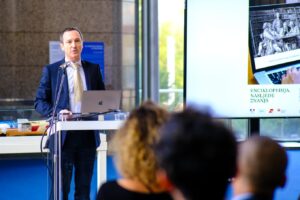
- How do you evaluate the economic relations between the two countries? France invests a lot in Croatia, what do the numbers show (imports, exports, investments…)? To what extent is this process two-way and how much do Croatian companies invest in France?
Our economic relations are progressing and trade flows have increased for the past two years. We are confident that it will soon materialize in a bigger share of the market. France is more present economically than before in Croatia. There are more than 60 French subsidiaries in Croatia accumulating more than 1 billion € of investments in Croatia and employing more than 5000 people in Croatia. And these figures do not even reflect the full scale of French economic presence in Croatia. French exports in Croatia have grown by 57% and Croatian imports in France by 75% in the past 5 years. We also hope for more Croatian investment in France – Rimac’s investment in Bugatti is a wonderful example of how our know-how and innovation can combine and create magic. The presence of the Croatian unicorn Infobip in France also reflects the fact that France is the number one destination for foreign investment in Europe and has a lot to offer Croatian investors, either from major companies or SMEs.
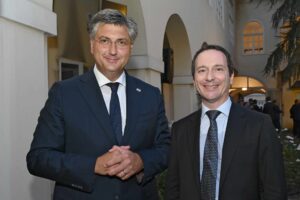
- Where do you see Europe and the EU in 10 years and what are the biggest challenges facing Europe that can threaten our values, way of life…?
I am confident that Europe is part of the solution to tackle the many challenges that we will face. Historically, the EU has been able to grow stronger and more unified through crises. This is what we have witnessed recently with the economic and health crises linked to COVID19, then with the Russian war of aggression against Ukraine: the EU has responded quickly, created new ways of working, and consensus in areas where we would never have thought it would be possible. There will be many challenges ahead, but I would probably mention climate change and the protection of our environment as number one – it will affect our way of life, increase natural hazards, etc in ways and proportions that we are just starting to realize. To tackle this issue, we need to stay focused and united in implementing the European Green Deal, driving investment for the energy transition in Europe towards low carbon technologies. These are areas where France and Croatia share a high level of ambition, commitment and potential, so we can work together and contribute to the global fight against global warming while supporting our economies and communities.
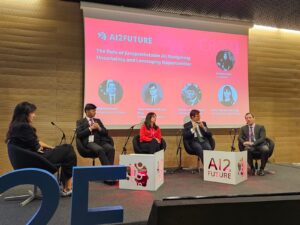
- How does official Paris view EU enlargement? In addition to the countries of the Western Balkans, there is also Ukraine and Moldova and Georgia?
President Macron has been very clear in his speech at GLOBSEC in Bratislava on 31 May 2023, when he said that the EU needed both to enlarge and to rethink its governance at the same time. In his own words, “It is the only way to meet the legitimate expectation of the Western Balkans, Moldova and Ukraine, which should become part of the European Union.”. Therefore, we welcome enlargement as necessary, while maintaining standards and expectations vis-à-vis candidate countries. While we maintain a close interest for countries of the Eastern neighborhood, given the geopolitical circumstances, we have an equally close interest for the Western Balkans. Remember, the region was identified as one of the two foreign policy priorities during the French presidency of the EU Council last year, and we believe we can work together with Croatia to efficiently support Western Balkan countries on their way to EU integration. Croatia can serve as a model and a mentor: thanks to a strong domestic consensus on the accession to the EU, it has carried out relentlessly reforms that were at time painful, but have ultimately transformed Croatia into a better more mature country, that is now converging towards the EU average – or even surpassing it – in many domains.
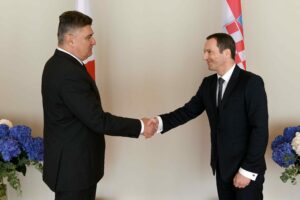
- You are a new resident of Zagreb. How do you like the city and have you already traveled around Croatia? What would you suggest to your friends to visit, try food, etc.?
Actually, thanks to the eurozone and Schengen, coming from France it’s very easy to feel immediately at home in Zagreb while enjoying the original culture that Croatia can offer. As a capital city, it feels like Zagreb is in the « goldilock zone », not too big, not too small, just right: since I have settled, I have been able to enjoy a rich cultural life and to easily escape to natural sites nearby. Though I have spent most of my time in Zagreb meeting with officials, business people, representatives of cultural institutions and civil society, I already had a few opportunities to visit the rest of the country: scientific seminars at the University of Split, a regional workshop we organised together with the government of Croatia in the Plitvice Lakes region on crimes against the environment, and even an underground ceremony beneath a mountain for the piercing of the second Učka tunnel in Istria, to which the Prime Minister was also attending. I look forward to visiting more regions and cities, in particular Osijek, Rijeka and Dubrovnik where we have a network of Alliances françaises promoting French language and culture. More occasions to taste the local food and discover the diversity of Croatian culture and landscapes !
